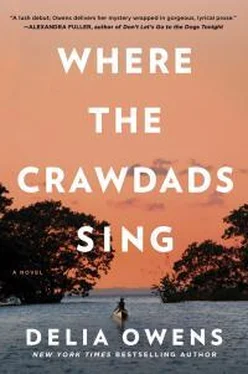“It’s just a hideout. I can stash some food ’case I have to go on the run awhile.”
Tate turned and looked at her as their eyes adjusted to the dark.
“Kya, you ever thought of just going back to school? It wouldn’t kill you, and they might leave you alone if you did.”
“They must’ve figured out I’m alone, and if I go, they’ll grab me, put me in a home. Anyway, I’m too old for school now. Where would they put me, first grade?” Her eyes widened at the notion of sitting in a tiny chair, surrounded by little kids who could pronounce words, count to fifty.
“What, so you plan to live alone in the marsh forever?”
“Better than going to a foster home. Pa used to say he’d farm us out to one if we were bad. Told us they’re mean.”
“No, they’re not. Not always. Most of them are nice people who like kids,” he said.
“You sayin’ you’d go to a foster home ’fore you’d live in the marsh?” she asked, chin jutted out, hand on her hip.
He was silent a minute. “Well, bring some blankets out, matches in case it gets cold. Maybe some tins of sardines. They last forever. But don’t keep fresh food; it’ll bring the bears in.”
“I ain’t scared of bears.”
“I’m not scared of bears.”
• • •
FOR THE REST of the summer Kya and Tate did the reading lessons at the tumbledown cabin. By mid-August they had read through A Sand County Almanac , and although she couldn’t read every word, she got most of it. Aldo Leopold taught her that floodplains are living extensions of the rivers, which will claim them back any time they choose. Anyone living on a floodplain is just waiting in the river’s wings. She learned where the geese go in winter, and the meaning of their music. His soft words, sounding almost like poetry, taught her that soil is packed with life and one of the most precious riches on Earth; that draining wetlands dries the land for miles beyond, killing plants and animals along with the water. Some of the seeds lie dormant in the desiccated earth for decades, waiting, and when the water finally comes home again, they burst through the soil, unfolding their faces. Wonders and real-life knowledge she would’ve never learned in school. Truths everyone should know, yet somehow, even though they lay exposed all around, seemed to lie in secret like the seeds.
They met at the log cabin several times a week, but she slept most nights in her shack or on the beach with the gulls. She had to collect firewood before winter, so made a mission of it, toting loads from near and far and stacking them somewhat neatly between two pines. The turnips in her garden barely poked their heads above the goldenrod; still she had more vegetables than she and the deer could eat. She harvested the last of the late-summer crop and stored the squash and beets in the cool shade of the brick-’n’-board steps.
But all the while, she kept her ears out for the lugging sounds of an automobile, filled with men come to take her away. Sometimes the listening was tiresome and creepy, so she’d walk to the log cabin and sleep the night on the dirt floor, wrapped in her spare blanket. She timed her mussel collecting and fish smoking so that Tate could take them to Jumpin’s and bring back her supplies. Keeping her underbelly less exposed.
• • •
“REMEMBER WHEN YOU READ your first sentence, you said that some words hold a lot?” Tate said one day, sitting on the creek bank.
“Yeah, I remember, why?”
“Well, especially poems. The words in poems do more than say things. They stir up emotions. Even make you laugh.”
“Ma used to read poems, but I don’t remember any.”
“Listen to this; it’s by Edward Lear.” He took out a folded envelope and read,
“Then Mr. Daddy Long-legs
And Mr. Floppy Fly
Rushed downward to the foamy sea
With one sponge-taneous cry;
And there they found a little boat,
Whose sails were pink and gray;
And off they sailed among the waves,
Far, and far away.”
Smiling, she said, “It makes a rhythm like waves hitting the beach.”
After that she went into a poem-writing phase, making them up as she boated through the marsh or looked for shells—simple verses, singsong and silly. “There’s a mama blue jay lifting from a branch; I’d fly too, if I had a chance.” They made her laugh out loud; filled up a few lonely minutes of a long, lonely day.
One late afternoon, reading at the kitchen table, she remembered Ma’s book of poetry and scrounged until she found it. The volume so worn, the covers had long since gone, the pages held together by two frayed rubber bands. Kya carefully took them off and thumbed through the pages, reading Ma’s notes in the margins. At the end was a list of page numbers of Ma’s favorites.
Kya turned to one by James Wright:
Suddenly lost and cold,
I knew the yard lay bare,
I longed to touch and hold
My child, my talking child,
Laughing or tame or wild . . .
Trees and the sun were gone,
Everything gone but us.
His mother sang in the house,
And kept our supper warm,
And loved us, God knows how,
The wide earth darkened so.
And this one by Galway Kinnell.
I did care. . . .
I did say everything I thought
In the mildest words I knew. And now, . . .
I have to say I am relieved it is over:
At the end I could feel only pity
For that urge toward more life.
. . . Goodbye.
Kya touched the words as if they were a message, as though Ma had underlined them specifically so her daughter would read them someday by this dim kerosene flame and understand. It wasn’t much, not a handwritten note tucked in the back of a sock drawer, but it was something. She sensed that the words clinched a powerful meaning, but she couldn’t shake it free. If she ever became a poet, she’d make the message clear.
• • •
AFTER TATE STARTED his senior year in September, he couldn’t come to Kya’s place as often, but when he did, he brought her discarded textbooks from school. He didn’t say a word about the biology books being too advanced for her, so she plowed through chapters she wouldn’t have seen for four years in school. “Don’t worry,” he’d say, “you’ll get a little more every time you read it.” And that was true.
As the days grew shorter, again they met near her shack because there wasn’t enough daylight to get to the reading cabin. They had always studied outside, but when a crazed wind blew one morning, Kya built up the fire in the woodstove. No one had crossed the shack’s threshold since Pa disappeared more than four years ago, and to ask anybody inside would seem unthinkable. Anyone but Tate.
“Wanta sit in the kitchen by the stove?” she said when he dragged his rig onto the lagoon shore.
“Sure,” he said, knowing not to make a big deal of the invitation.
As soon as he stepped inside the porch, he took nearly twenty minutes to explore and exclaim over her feathers and shells and bones and nests. When they finally settled at the table, she pulled her chair close to his, their arms and elbows nearly touching. Just to feel him near.
With Tate so busy helping his dad, the days dragged slow from nose to tail. Late one evening she took her first novel, Rebecca by Daphne du Maurier, from Ma’s bookshelf and read about love. After a while she closed the book and walked to the closet. She slipped on Ma’s sundress and swished around the room, flipping the skirt about, whirling in front of the mirror. Her mane and hips swaying, she imagined Tate asking her to dance. His hand on her waist. As if she were Mrs. de Winter.
Abruptly she caught herself and bent over, giggling. Then stood very still.
Читать дальше











